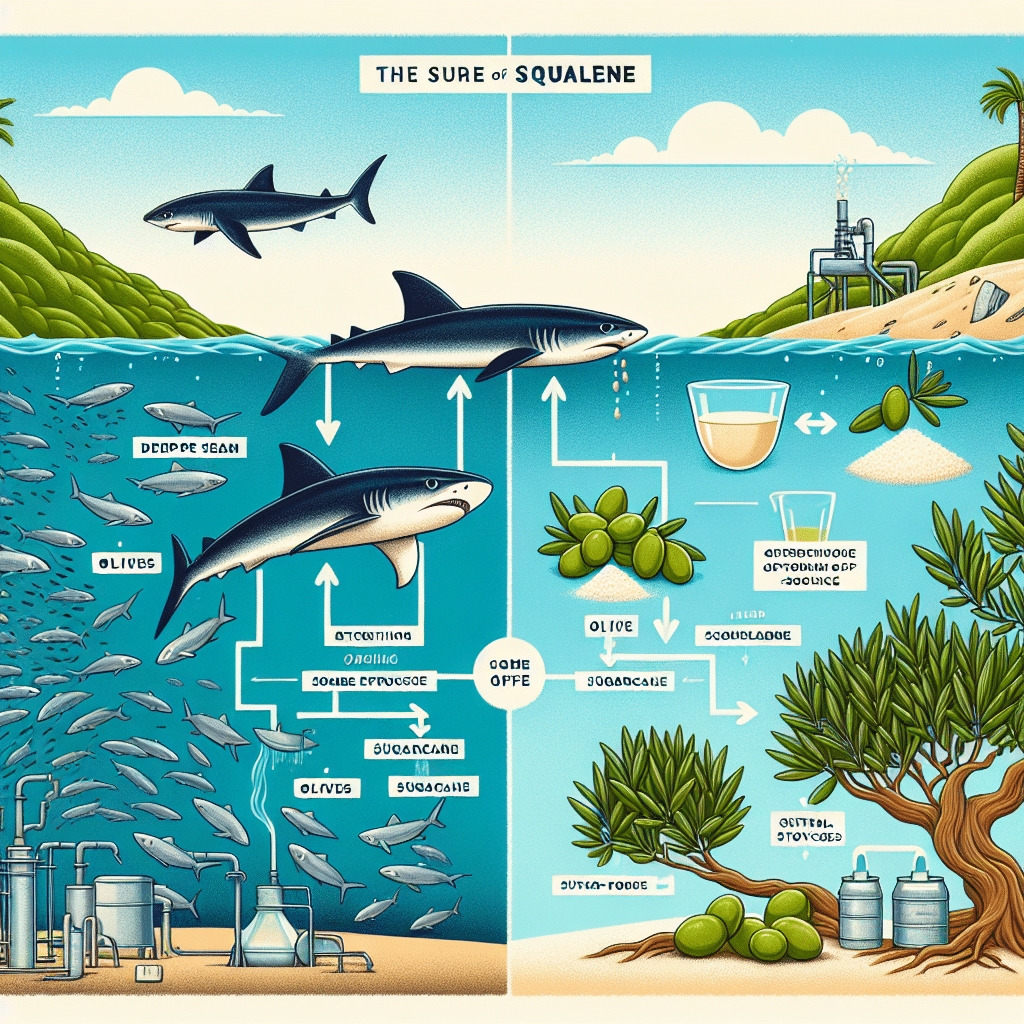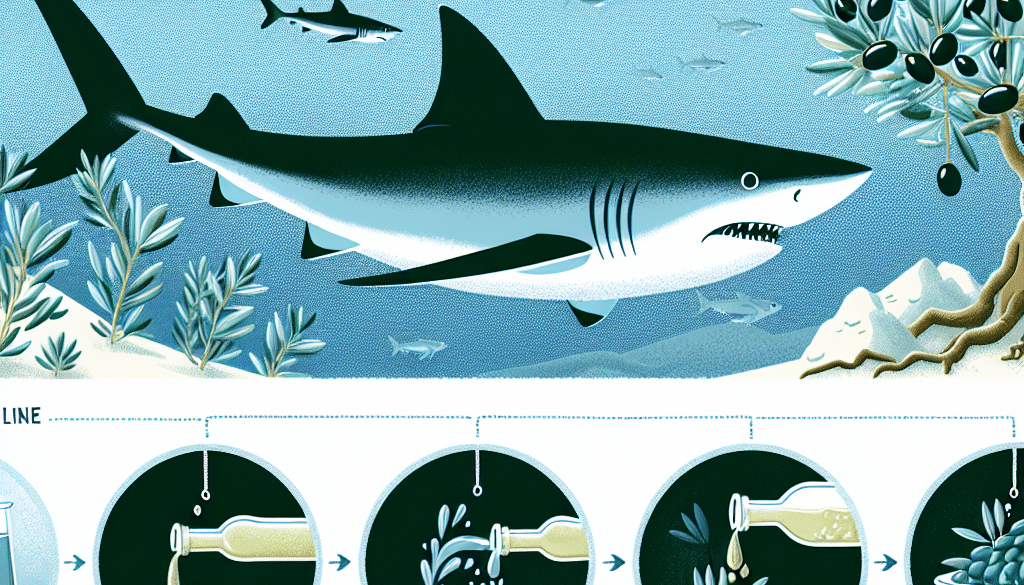What Is Squalene Made From? Origins
-
Table of Contents
- Squalene: Unveiling Its Natural Origins and Sources
- Understanding Squalene: A Brief Overview
- Natural Sources of Squalene
- Extraction and Production of Squalene
- Shark Conservation and Ethical Concerns
- Plant-Based Squalene: A Sustainable Alternative
- Applications of Squalene
- Case Studies and Statistics
- Conclusion: Embracing Sustainable Squalene
- Discover ETprotein’s High-Quality Protein Products
Squalene: Unveiling Its Natural Origins and Sources

Squalene is a fascinating organic compound that has garnered significant attention in various industries, particularly in cosmetics, pharmaceuticals, and nutrition. Its unique properties and benefits have made it a sought-after ingredient, but where does squalene come from? This article delves into the origins of squalene, exploring its natural sources and the processes involved in its extraction and production.
Understanding Squalene: A Brief Overview
Squalene is a hydrocarbon, a natural and vital part of the synthesis of cholesterol, steroid hormones, and vitamin D in the human body. It is also a precursor to the whole family of steroids. Structurally, it is a triterpene, which means it is assembled from isoprene units, giving it a unique molecular makeup that is both stable and versatile.
Natural Sources of Squalene
Squalene is found in a variety of natural sources, both animal and plant-based. Here’s a closer look at where squalene is derived from:
- Shark Liver Oil: Historically, the most well-known source of squalene has been the liver oil of sharks, particularly deep-sea species like the Centrophorus and Squalidae families. These sharks store squalene in their livers, which helps them regulate their buoyancy in the ocean depths.
- Plant-Based Sources: Squalene is also present in many plant oils. Amaranth seed, rice bran, wheat germ, and olives are notable examples. Olive oil, in particular, is a rich source of squalene, which contributes to its nutritional and cosmetic value.
- Other Marine Sources: Besides sharks, squalene can also be found in smaller amounts in other marine life, such as algae and certain bacteria.
- Human Skin: Squalene is a component of human sebum, the natural oil produced by our skin. It plays a role in maintaining the skin’s moisture barrier and protecting against environmental damage.
Extraction and Production of Squalene
The process of extracting squalene varies depending on the source. From shark liver oil, squalene is obtained through a process of vacuum distillation. Plant-based squalene involves pressing and refining the oils from the respective seeds or germ. Advances in technology have also led to the development of bioengineered yeast and bacteria that can produce squalene, offering a sustainable and ethical alternative to shark-derived squalene.
Shark Conservation and Ethical Concerns
The extraction of squalene from sharks has raised significant environmental and ethical concerns. Overfishing and the targeting of sharks for their liver oil have contributed to the decline of shark populations worldwide. This has prompted a search for more sustainable and cruelty-free sources of squalene.
Plant-Based Squalene: A Sustainable Alternative
Given the conservation issues surrounding shark-derived squalene, plant-based alternatives have become increasingly popular. Olive oil, in particular, has emerged as a sustainable source of squalene. It is readily available, renewable, and does not involve harming marine ecosystems. Additionally, the cultivation of olives and other squalene-rich plants can have positive environmental impacts when done sustainably.
Applications of Squalene
Squalene’s unique properties make it valuable in various applications:
- Cosmetics: In skincare, squalene is prized for its moisturizing properties and ability to be absorbed quickly by the skin without leaving a greasy residue.
- Pharmaceuticals: Squalene is used as an adjuvant in vaccines to enhance the immune response.
- Nutritional Supplements: Due to its antioxidant properties, squalene is included in dietary supplements to support overall health.
Case Studies and Statistics
Research has shown that squalene’s antioxidant properties can have beneficial effects on skin health and the immune system. For instance, a study published in the “Journal of Dermatological Science” found that squalene can protect the skin from UV radiation and free radical damage. Additionally, the global demand for squalene is on the rise, with the market expected to grow significantly in the coming years, reflecting its increasing popularity in various industries.
Conclusion: Embracing Sustainable Squalene
In conclusion, squalene is a versatile compound with origins in both the animal kingdom and the plant world. While shark liver oil has traditionally been a primary source, the shift towards plant-based squalene reflects a growing commitment to sustainability and ethical sourcing. As consumers become more aware of environmental issues, the demand for plant-derived squalene is likely to continue increasing, offering a win-win for both industry and conservation efforts.
Discover ETprotein’s High-Quality Protein Products
If you’re interested in health and nutrition, consider exploring ETprotein’s range of protein products. ETprotein specializes in high-quality, organic bulk vegan proteins and L-(+)-Ergothioneine (EGT) that cater to various industries, including nutraceuticals, pharmaceuticals, and food and beverage. Their products are non-GMO, allergen-free, and characterized by a neutral taste, ensuring that they meet the highest standards of quality and purity.
About ETprotein:
ETprotein, a reputable protein and L-(+)-Ergothioneine (EGT) Chinese factory manufacturer and supplier, is renowned for producing, stocking, exporting, and delivering the highest quality organic bulk vegan proteins and L-(+)-Ergothioneine. They include Organic rice protein, clear rice protein, pea protein, clear pea protein, watermelon seed protein, pumpkin seed protein, sunflower seed protein, mung bean protein, peanut protein, and L-(+)-Ergothioneine EGT Pharmaceutical grade, L-(+)-Ergothioneine EGT food grade, L-(+)-Ergothioneine EGT cosmetic grade, L-(+)-Ergothioneine EGT reference grade and L-(+)-Ergothioneine EGT standard. Their offerings, characterized by a neutral taste, non-GMO, allergen-free attributes, with L-(+)-Ergothioneine purity over 98%, 99%, cater to a diverse range of industries. They serve nutraceutical, pharmaceutical, cosmeceutical, veterinary, as well as food and beverage finished product distributors, traders, and manufacturers across Europe, USA, Canada, Australia, Thailand, Japan, Korea, Brazil, and Chile, among others.
ETprotein specialization includes exporting and delivering tailor-made protein powder and finished nutritional supplements. Their extensive product range covers sectors like Food and Beverage, Sports Nutrition, Weight Management, Dietary Supplements, Health and Wellness Products, and Infant Formula, ensuring comprehensive solutions to meet all your protein needs.
As a trusted company by leading global food and beverage brands and Fortune 500 companies, ETprotein reinforces China’s reputation in the global arena. For more information or to sample their products, please contact them and email sales(at)ETprotein.com today.














